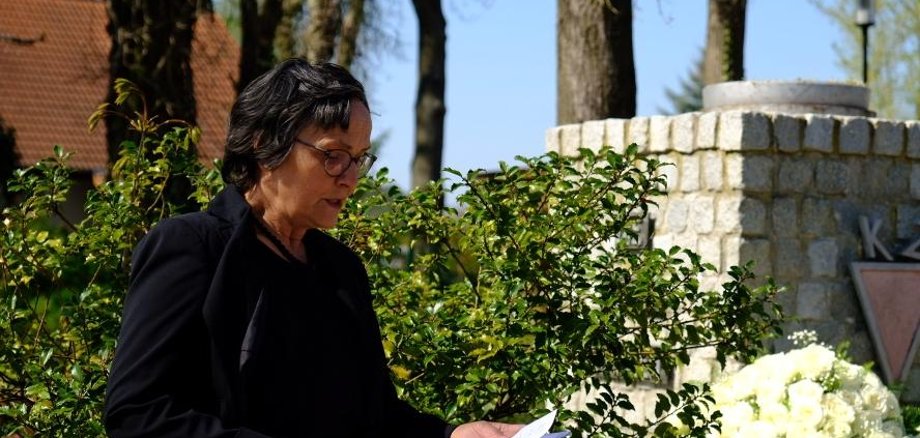Press release 14/2020 of the municipality of Rüdersdorf near Berlin
Today, 21 April 2020, the mayor of the municipality of Rüdersdorf near Berlin, Sabine Löser, laid an arrangement of 75 white roses at the memorial of the Association of Persecutees of the Nazi Regime in Hennickendorf. The occasion was the 75th anniversary of the liberation of today's districts of the municipality of Rüdersdorf near Berlin from the terror of the Nazis by the Red Army.
Originally, a larger event with contemporary witnesses was planned, but this was cancelled due to the current coronavirus situation. In addition to the local councillors, the chairman of the municipal council and his deputies as well as the parliamentary group chairmen of the municipal council were also invited to the small ceremony.
The event was musically accompanied by Lucy Krienke on the flute, who played the Ode to Joy as a symbol of hope and the unity of Europe.
We are publishing extracts of Sabine Löser's speech below:
"Ladies and gentlemen, dear guests,
Three quarters of a century ago, the Red Army liberated the present-day municipality of Rüdersdorf near Berlin and its neighbourhoods from the barbarity of the Nazi regime. The Second World War claimed more than 50 million lives, half of them in the Soviet Union alone and more than half of them civilians. That was three quarters of a century ago, almost an entire human life.
And yet they still exist, the last contemporary witnesses - the survivors of the concentration camps, the people who experienced the horror of war and survived it. Including our own parents, who are now very old. They all need to be listened to.
[...]
Our responsibility arises from this listening. All of us who still have the chance to listen to the survivors should do just that. And we should orientate our actions accordingly.
It would be a presumptuous assumption to assume that we can reproduce everything that these people experienced in anything like the same way. But we can make sure that it applies forever and ever:
"Nothing is forgotten - and - nobody is forgotten."
We can pass that on.
On the 40th anniversary of the liberation, on 8 May 1945, the then Federal President Richard von Weizäcker said the following. I may quote:
"No sentient person expects them to wear a penitent's shirt just because they are Germans. But their ancestors have left them a heavy legacy. All of us, whether guilty or not, whether old or young, must accept the past.
We are all affected by its consequences and are liable for them. It is not a question of coming to terms with the past. You can't do that. It cannot be changed or undone retrospectively. But those who close their eyes to the past become blind to the present.
Those who do not want to remember inhumanity become susceptible to new dangers of infection."
35 years after this speech, the admonishing words of the then Federal President are frighteningly topical and explosive. This makes our responsibility all the more important - to tell the world again and again where hatred and hatred, nationalism and racism, violence and marginalisation lead. It is also our responsibility to speak out when we again witness an ever-increasing brutalisation of our language.
[...]
21 April 1945 was the day of liberation for Rüdersdorf and its districts - 2 ½ weeks later, the Nazis finally surrendered for good.
Matthias Platzeck advised in his speech on the 75th anniversary of the bridgehead formation in Kienitz at the beginning of this year to deal with history in a concrete and honest way. It was not the Allied landing in Normandy that was the decisive turning point in the Second World War - in his view, historians misjudge the significance of the events in the Soviet Union.
Allow me to quote again:
"The world war had already been won before that. In the Battle of Moscow in 1941/42, in Stalingrad in 1942/43, in the Kursk Bulge, in Leningrad and Sevastopol," Platzeck said in Kienitz in January.
Today we remember and thank our liberators.
Before I finish, however, I would also like to point out what wonderful things have been created in the last 75 years: There is certainly room for criticism of what Europe is and means today. At the same time, we live in a peaceful Europe of open borders. For the younger generation, a Europe with closed borders, as we East Germans knew it and as we are experiencing it again due to coronavirus, is completely unfamiliar and unsettling.
Let us defend this freedom and openness to the world: In Rüdersdorf, in Brandenburg, in Germany and in Europe.
With this in mind, it is fitting that we can listen to the European anthem - the Ode to Joy - at the end.

